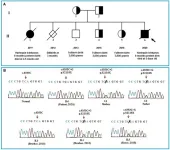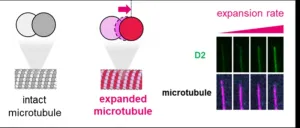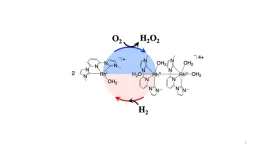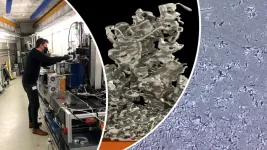(Press-News.org) The American Society for Biochemistry and Molecular Biology today announced its 2023 class of fellows. The honorific program recognizes scientists who have made outstanding contributions to the field through their research, teaching, mentoring or other forms of service.
The society will recognize the 20 new fellows at its annual meeting, Discover BMB, later this month in Seattle. The presentation will be part of the society's presidential address and business meeting scheduled for Saturday, March 25.
“This group truly represents members who have provided exceptional commitment to our society through their service as well as outstanding contributions to advance the molecular life sciences,” said Judith Bond, chair of the fellows subcommittee. “They reflect the breadth and diversity of our members as researchers, educators, mentors and/or advocates of our profession. It is an honor to have these individuals represent ASBMB, and we look forward to seeing them continue to serve as role models and mentors to aspiring scientists.”
The fellows are:
Charles Brenner, City of Hope
Craig Cameron, University of North Carolina School of Medicine
Gregory Gatto, GSK
James Ntambi, University of Wisconsin–Madison
Judith Storch, Rutgers University
Kelly Ten Hagen, National Institute of Dental and Craniofacial Research, National Institutes of Health
Marilee Benore, University of Michigan–Dearborn
Mark Lemmon, Yale University
Melissa Starovasnik, formerly of Genentech
Michael Pikaart, Hope College
Norma Allewell, University of Maryland
Pamela Mertz, St. Mary's College of Maryland
Phillip Ortiz, State University of New York
Robert Haltiwanger, University of Georgia
Sonia Flores, University of Colorado Anschutz Medical Campus
Susan Baserga, Yale School of Medicine
Susan Forsburg, University of Southern California
Susan Marqusee, University of California, Berkeley
Thomas Baldwin, University of California, Riverside
William Smith, University of Michigan Medical School END
ASBMB announces 2023 class of fellows
2023-03-09
ELSE PRESS RELEASES FROM THIS DATE:
Novel rare skin mutation gene identified by whole exome sequencing - BGI Case Report
2023-03-09
Harlequin ichthyosis (HI) is a severe genetic skin disorder characterized by thick white, brown, or dark brown patches on the skin covering a newborn's entire body. HI has a low incidence of 1 per 300,000 live births but comes with the highest mortality rate among skin conditions. It is caused by a mutation in the ABCA12 gene, which codes for a protein involved in transporting lipids necessary for the formation of the skin barrier. Such protein shortage leads to a weaker epidermal barrier.
A recent study, co-authored by BGI Genomics Dr. Thomas Qiu, published in Frontiers in Pediatrics covers ...
Like a flexible Lego railway track: How stable microtubules form within cells
2023-03-09
Like poles support a tent, microtubules—hollow cylindrical structures made of tubulin protein—support eukaryotic cells. But microtubules provide more than just mechanical strength; they help prepare the cell for cell division and migration and work as a railway track on which motor proteins transport materials within the cell. The formation of microtubules within cells resembles how a child assembles a Lego train track. The tubulins—Lego bricks—constantly assemble and disassemble to make the microtubule—train track—longer and shorter in processes called polymerization and depolymerization. The processes are regulated by microtubule-associated proteins such ...
What if California didn’t close down during the pandemic?
2023-03-09
SAN FRANCISCO (March 9, 2023) — Researchers at the California Academy of Sciences, along with a collaborator at Denison University, have developed an innovative new model to assess how the California economy might have fared without economic closures to slow the spread of the coronavirus pandemic. Their initial findings—published today in Frontiers in Physics—reveal that under a “business-as-usual” approach wherein there were no business closures, California’s economy would have generally been better off than in reality. However, the economic impacts would still have been substantial and ...
Americans share fake news to fit in with social circles
2023-03-09
Both conservative and liberal Americans share fake news because they don’t want to be ostracized from their social circles, according to research published by the American Psychological Association.
“Conformity and social pressure are key motivators of the spread of fake news,” said lead researcher Matthew Asher Lawson, PhD, an assistant professor of decision sciences at INSEAD, a business school in France. “If someone in your online tribe is sharing fake news, then you feel pressure to share it as well, even if you don’t ...
A safe synthesis of hydrogen peroxide inspired by nature
2023-03-09
Fukuoka, Japan—Hydrogen peroxide is a ubiquitous chemical found in most homes and used in everything from dying hair to treating wounds. It is also an invaluable agent for many industries from food, textiles, and even in semiconductor production.
Reporting in JACS, researchers at Kyushu University have developed a new process to synthesize this chemical utilizing a new homogeneous catalyst inspired by nature. Moreover, the process is significantly safer than conventional methods.
Scientists have been reporting the synthesis ...
A novel mechanism may be effective in patients with severe hypertriglyceridemia and prior episodes of acute pancreatitis
2023-03-09
A novel type of therapy, known as ANGPTL3 inhibitor therapy, was effective in lowering triglycerides in certain types of patients with severe hypertriglyceridemia (sHTG) who had a prior episode(s) of acute pancreatitis. sHTG is a well-established risk factor for recurrent episodes of acute pancreatitis. These high-risk patients were the focus of a phase 2 study that was led by the Icahn School of Medicine at Mount Sinai and sponsored and funded by Regeneron.
This ANGPTL3 inhibitor therapy, the intravenous drug evicanumab-dgnb, inhibits two important regulators of lipoprotein metabolism. ...
Researchers unveil smart contact lens, capable of implementing AR-based navigation
2023-03-09
With the advent of the Metaverse era, there have been growing expectations that virtual reality (VR) and augmented reality (AR) technologies will likely to enhance convenience in everyday life, as well as industry productivity performance.
A joint research team, affiliated with UNIST has introduced core technology for smart contact lenses that can implement AR-based navigation through a 3D printing process. According to the research team, the new smart contact lenses can be worn inside the eye of a person, like a normal contact lens.
Published in the February 2023 issue of Advanced Science, this breakthrough has been jointly led by ...
3D battery imaging reveals the secret real-time life of lithium metal cells
2023-03-09
Innovative battery researchers have cracked the code to creating real-time 3D images of the promising but temperamental lithium metal battery as it cycles. A team from Chalmers University of Technology, Sweden, have succeeded in observing how the lithium metal in the cell behaves as it charges and discharges.
The new method may contribute to batteries with higher capacity and increased safety in our future cars and devices.
“We’ve opened a new window in order to understand – and in the long term to optimise – the lithium metal batteries of the future. When we can study exactly what happens to the lithium in ...
Naturally occurring peptide may tackle the ‘root cause’ of obesity-related conditions
2023-03-09
Research published today shows that a peptide (small protein) called PEPITEM could provide a revolutionary approach to reducing the risk of type 2 diabetes and other obesity-related diseases such as hepatic steatosis (fatty liver).
The researchers used an animal model of obesity to investigate whether PEPITEM, delivered by a slow-release pump, could prevent or reverse the effects that a high fat diet has on the pancreas. Excitingly, the results showed that administration of PEPITEM significantly reduced the enlargement of insulin-producing cells in the pancreas and ...
C-reactive protein reduces the immune response in inflammatory disease
2023-03-09
The biological function of the C-reactive protein, CRP, has long been unknown. Researchers at Linköping University in Sweden now show that this protein has a beneficial function in systemic lupus erythematosus, SLE, an inflammatory disease. But this is true only for one of CRP’s two forms, according to the study published in Journal of Autoimmunity.
Most of us have had a CRP blood test on more than one occasion. This is a very common routine health care test used to detect infection or systemic inflammation in the body. What is measured is the level of C-reactive protein, or CRP for short.
“CRP ...







